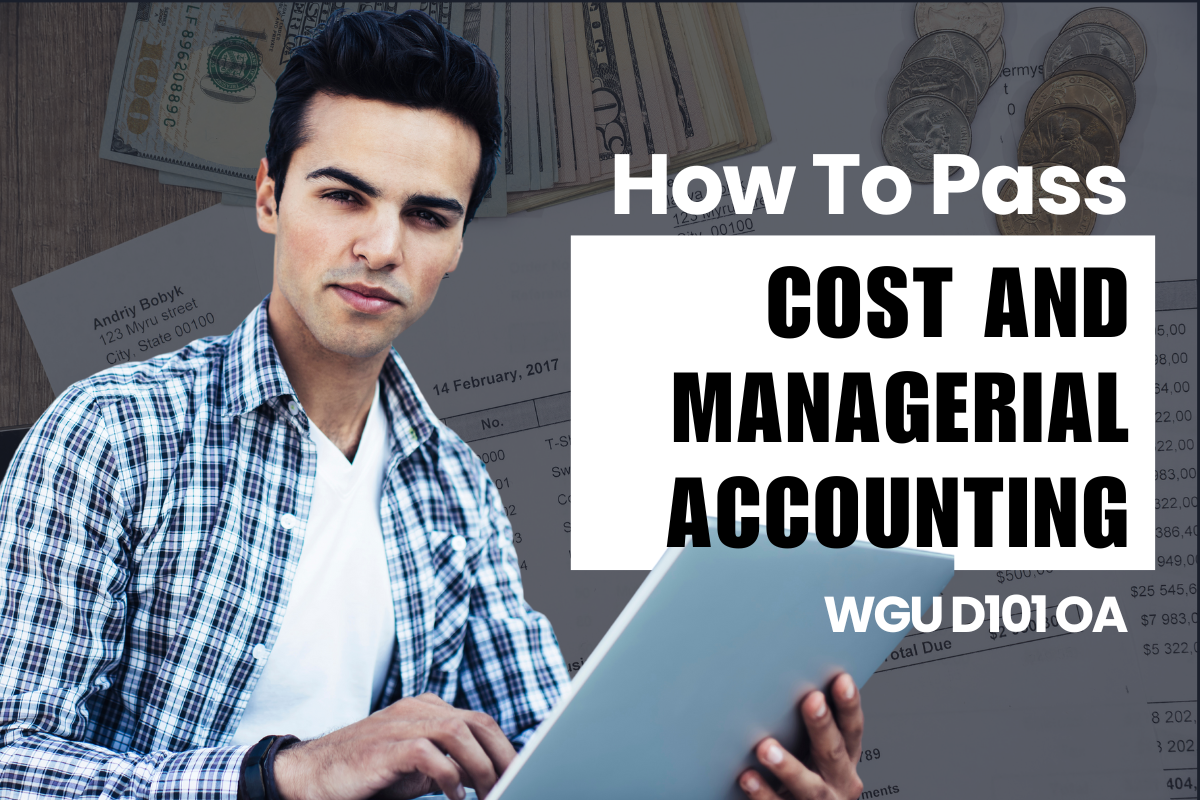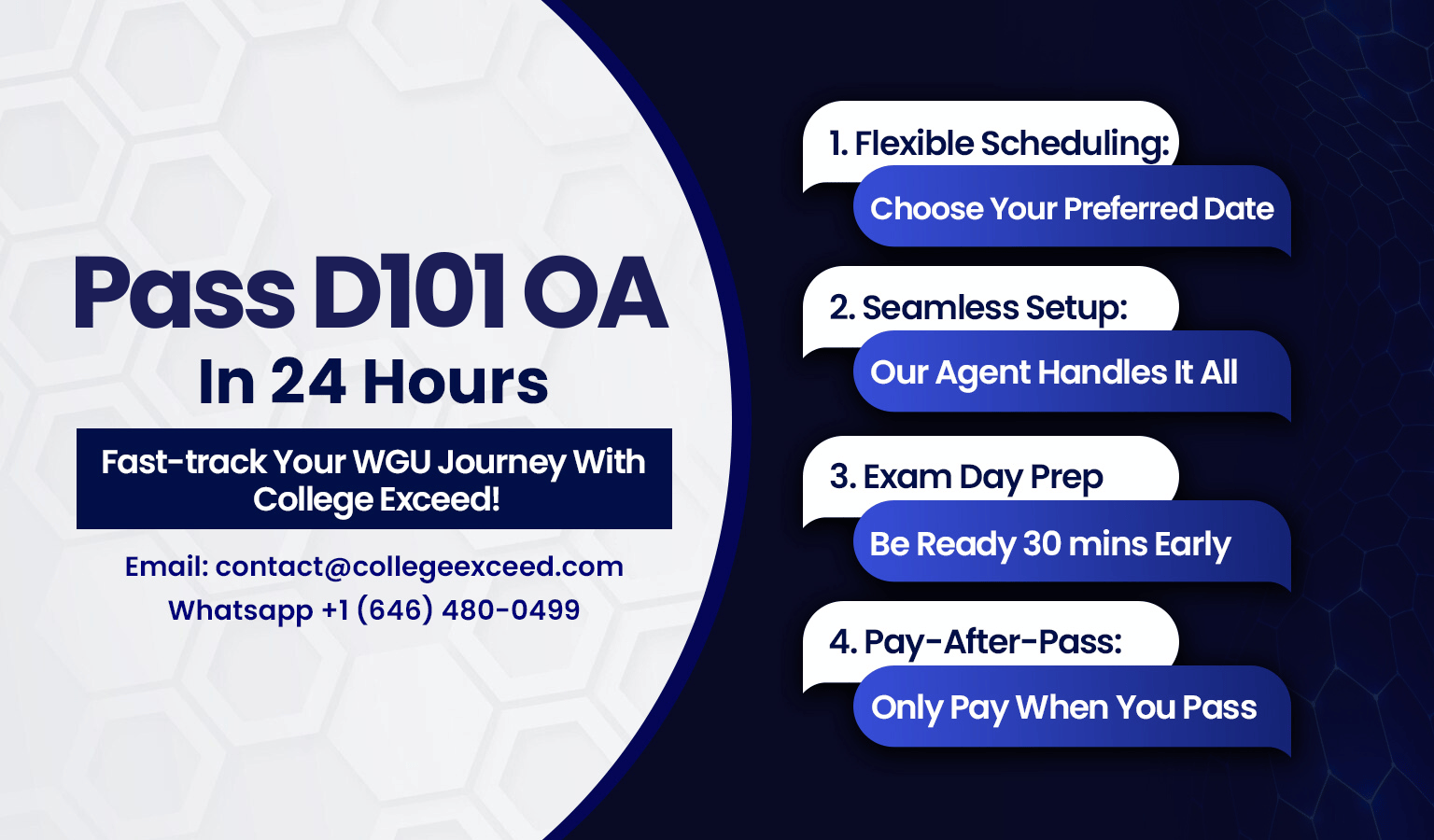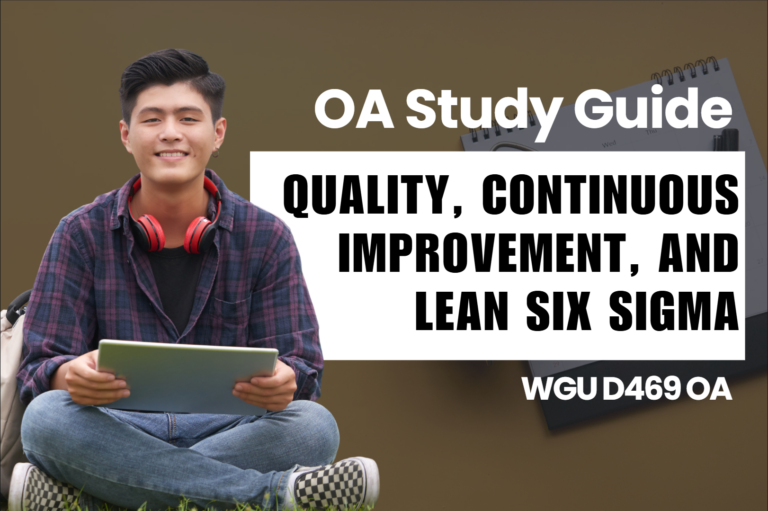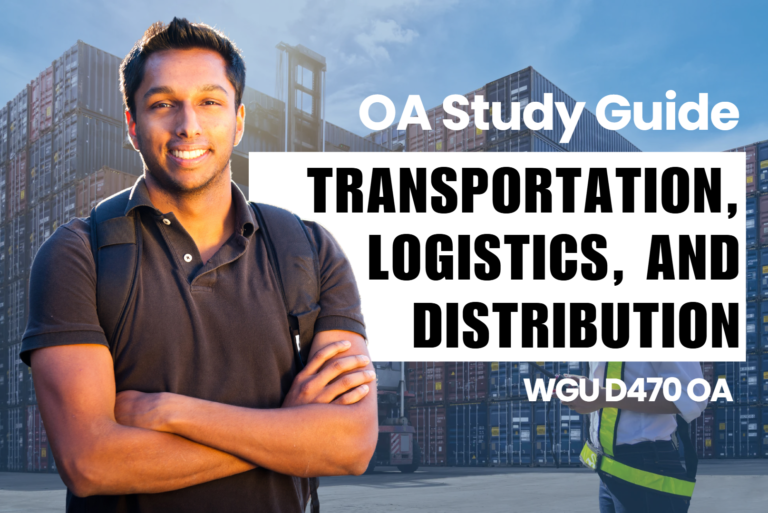Welcome fellow WGU students, to this blog article dedicated to helping you succeed in the Cost and Managerial Accounting WGU D101. This module is known to be one of the most tedious to study, and it can be challenging to grasp the course content. If you’re struggling to know where to start or how to approach your studies effectively, we’ve got your back. We have conducted comprehensive research on this module to provide you with the most effective strategies and insights. In this article, we will guide you through;
Let’s take this study journey together, and we’ll show you how to pass the module with ease. Remember, persistence and a structured approach are key to mastering this subject. We wish you the best of luck in your studies and look forward to celebrating your success!
...
What to Expect in Module WGU D101 📖
Cost and Managerial Accounting WGU D101 is designed to equip you with the essential concepts and procedures necessary for effective management control and decision-making. Throughout this course, you will learn to identify, collect, and interpret accounting data to support various managerial functions. Key topics include budgeting, cost-volume-profit analysis, job costing, process costing, activity-based costing, standard costing, and differential analysis. This module builds on the foundational knowledge gained from prerequisite courses, such as Principles of Accounting and Financial Accounting, ensuring you are well-prepared to delve deeper into these advanced concepts.
To help you master the material, the course employs the MyEducator learning platform, which offers a range of instructional materials tailored to different learning styles. Each unit includes instructional videos that visually explain complex topics, a web-based textbook for detailed reading and reference, and experiential spreadsheet activities that allow you to apply what you’ve learned in practical scenarios. Engaging with these diverse resources will enhance your understanding and retention of the course content, preparing you for the final exam and real-world applications.
In this module, you will go through the below topics. (Weightage on the OA is mentioned as a percentage)
Unit 1: Introduction
Unit 2: Job Order Costing (20%)
- Module 1 – Job Order Costing Characteristics
- Module 2 – Job Order Costing Cost Flows
- Module 3 – Job Order Costing Reports
Unit 3: Process Costing (13%)
- Module 4 – Process Costing Characteristics
- Module 5 – Process Costing Equivalent Units
- Module 6 – Process Costing Cost Flows
Unit 4: Activity-Based Costing (7%)
- Module 7 – Activity-Based Costing Characteristics
- Module 8 – Activity-Based Costing Overhead Allocation
Unit 5: Cost-Volume-Profit (CVP) Analysis (10%)
- Module 9 – CVP Analysis Basics
- Module 10 – CVP Analysis Applications
Unit 6: Standard Costs and Variances (10%)
- Module 11 – Standard Costs and Variances Basics
Unit 7: Master Budgeting (20%)
- Module 12 – Master Budgeting Operating Budgets
- Module 13 – Master Budgeting Cash Budgets
Unit 8: Differential Analysis (20%)
- Module 14 – Differential Analysis Applications
As you prepare for the final exam, focus on reviewing each topic thoroughly, practicing with the provided spreadsheet activities, and re-watching instructional videos to reinforce your understanding. Consistent study and utilization of all available resources on MyEducator will be crucial in ensuring your success in this module. Remember, the skills and knowledge you acquire in Cost and Managerial Accounting are invaluable for your future career in management and accounting.
Ultimate Study Guide📝
Here we will discuss how to approach the course content of D101 and what is required to face the final challenge of this module. As the module is theory-heavy, you will need to use your memorization skills to get through most of the obstacles you will face. If you follow our comprehensive study guide, we guarantee that you will be well-equipped to face the OA at the end of your study journey. Make sure to go through each step of the guide at your own pace and adhere to the advice provided to maximize the outcome. So prepare yourself for the journey ahead and let us begin…
Step 1 – Read the Textbook
To start our studies on the course material, we have chosen the WGU-provided textbook for module D101 as our main resource. As the OA of D333 is built upon this textbook, it is important that you understand each and every concept provided in this document to be well-equipped to pass it on your first attempt. To find the Textbook, navigate to the below-mentioned location.
- Go to the Student Portal of WGU > Log onto your student profile > Go to the “Cost and Managerial Accounting WGU D101” page > Click on the “Go to course materials”
While you go through each of the topics in the textbook make sure to attempt all the knowledge checks, quizzes, and unit tests that you will come across. These are significant resources to help you understand the depth of the questions you will be tested on in the OA and evaluate your knowledge of the subject matter. The Textbook will also include supplemental videos that will help you clarify complicated theories and break them down into digestible pieces. We recommend you take time to watch these videos to utilize the Textbook to its maximum capacity.It is important to note that the Textbook contains a lot of material to go through, which might hinder your progress and make it harder to memorize the significant concepts of D101. So make short notes on the course content to help you revise them at your convenience to utilize them as a handy study resource.
Step 2 – Watch the cohort recordings
In the second step of our study guide, we will refresh our knowledge on the course material by going through the recorded cohorts of D101. These cohorts are conducted by the course instructors of this module, who are highly knowledgeable and highly experienced in everything D101. They are a gold mine of information. You will be able to not only deep dive into the course content but also learn valuable advice from the instructors on how to face the OA. So take your time to go through each video and revise your memory. To locate the video lectures;
- Go to the Student Portal of WGU > Log onto your profile > Go to the Ethics in Technology WGU D333 page > Click on the “Course Search” button > Find and open the link “D101 Course Resource Page” > Scroll down on the document until you find the topic “D101 Cohort Session Recordings and Resource Files”
Here you will be able to find the links to the recorded cohorts as well as the accompanying PowerPoint slides. Take your time to go through each of the recordings and note down the information in your short notes. Pay special attention to the “Master Budgeting” cohort as the knowledge provided in this cohort will be highly valuable in passing the OA.
Once you go through all the cohorts, we recommend that you attempt the calculation problems in the Textbook once more. As the cohorts help you simplify the theories and help you grasp them better, redoing the calculations will help you solidify this knowledge to help you in the long run.
Step 3 – Memorize the formulas
The most significant part of the module Cost and Managerial Accounting WGU D101 is the formulas you learn to do many different calculations. These formulas will be tested again and again in the final OA in this module, so having in-depth knowledge of these will be a significant advantage. While you study the course content, try to understand why the formulas work, this will help you with committing the formulas to your memory easily. Also, we recommend that you make flashcards on these formulas and go through them regularly in your free time to memorize them. Also, you can find a document in the course chatter that lists the formulas on D101 to help you refer to them easily. Follow the below-given instructions to find the document.
- Go to the Student Portal of WGU > Log onto your profile > Go to the Ethics in Technology WGU D333 page > Click on the “Course Chatter” button > Go to the Group files section of the page and find the link to download “C250 formulas to remember.pdf”
Step 4 – Attempt the Pre-A
Now that we have prepared ourselves for the assessments of this module, let us start by taking the Pre-A of D101. The Pre-A is a mock assessment that simulates the OA to test your skills and help you identify your weak points. Treat the Pre-A as a real assessment and go through it to evaluate the knowledge you have gained in this module.
Once you have completed the Pre-A, a coaching report will be automatically generated for you in the same location you found the Pre-A. Open this report and use it to identify the topics you have scored the lowest on. Once you identify your weak points, use the Textbook as well as short notes you have taken to revise your knowledge in these topics and refresh your knowledge. Afterwards, retake the Pre-A and try to achieve a score of 85% or more. If you fail to achieve this score, follow the same process and refresh your memory, then retake the Pre-A. Repeat this until you pass the Pre-A with more than 85% score.
Step 5 – Face the OA
Once you pass the Pre-A, you can be assured that you are equipped with the knowledge to face the OA and ace it. So without hesitation, let us take on the final challenge and achieve success in this module D101. To help you with the OA, we have provided you with some tips and tricks to utilize in your attempt in the next section of the article. Also, you can find external resources we have listed to help you study and gain additional knowledge on the course content. Take your time to go through this section to help you pass the OA with ease.
To take the OA, you should:
- Schedule the OA at a convenient time and date for you
- Make sure you have a stable internet connection, a webcam, and a microphone.
- Follow the proctoring instructions and rules carefully.
- Use the same strategies and skills that you used for the Pre-A
- Relax and be confident in your abilities.
Good luck!
...
Tips and Tricks to Face the OA👨🏻🏫
Successfully passing the Objective Assessment (OA) for Cost and Managerial Accounting requires strategic preparation and effective test-taking techniques. Here are some valuable tips and tricks to help you excel:
- Utilize the Provided Time Wisely: Ensure you allocate your time effectively to answer all questions. If you encounter a difficult question, skip it and return to it later. This approach helps maintain momentum and ensures you answer the questions you are confident about first.
- Braindump Key Formulas: At the beginning of the assessment, use the provided whiteboard to jot down important formulas and concepts. Write down all six variances and differential analysis formulas. This practice serves as a quick reference during the test and helps reduce cognitive load.
- Leverage the Practice Assessments (PA): The questions in the Practice Assessments are very similar to those in the Objective Assessment. Review the PA thoroughly, as many of the multiple-choice questions in the OA are the same, just with different numbers or situations. This familiarity can significantly boost your confidence and performance.
- Identify Trigger Questions: Some questions in the OA may trigger answers to others. Pay attention to this, as recognizing these connections can provide valuable hints and save you time.
- Know Unit Conversions: Ensure you are comfortable converting between units, such as gallons to pounds. This skill is crucial for answering certain questions accurately.
- Prepare for the Excel Portion: The Excel portion of the OA is notably challenging and differs significantly from the PA. The Excel tasks will look similar to Module 12, Tables 7.15 and 7.16, where you fill in almost all information except the units to be produced. You’ll use something like Table 7.11 to pull information from. Be prepared to use the SUM function to add amounts, reference cells without hardcoding, and correctly use the $ symbol when copying formulas.
Key Concepts to Master for the OA
- Journal Entries: Know your journal entries well, as several questions will test this knowledge. These questions can be easy points, especially if you’re struggling with other areas.
- Budgeting: Be proficient in Direct Materials (DM), Direct Labor (DL), Manufacturing Overhead (MOH), and Selling & Administrative Expense Budgeting. Understanding how to calculate and put together these budgets is crucial.
- Cost-Volume-Profit (CVP) Analysis: Mastering CVP analysis is essential, as it is a fundamental concept tested in the OA.
- Variances and Master Budgets: Ensure you understand variances and how the master budget is put together. This includes knowing how to calculate and assemble Direct Materials, Direct Labor, and Selling and Administrative Budgets.
...
External Resources to Study📂
...
FAQ ❓
Q: What is the focus of Cost and Managerial Accounting WGU D101?
A: The course focuses on equipping you with the skills to identify, collect, and interpret accounting data for management control and decision-making. You will cover key topics such as budgeting, cost-volume-profit analysis, job costing, process costing, activity-based costing, standard costing, and differential analysis.
Q: What are the prerequisites for this course?
A: Before taking this course, you should have completed Principles of Accounting and Financial Accounting. These prerequisite courses provide the foundational knowledge necessary to understand the more advanced concepts in Cost and Managerial Accounting.
Q: Are the PA and OA questions similar?
A: Yes, many multiple-choice questions in the OA are very similar to those in the PA, with variations in numbers or scenarios. Reviewing the PA thoroughly can significantly aid your preparation.
Q; How often should I study for this course?
A: Consistent study is key. Aim to study regularly, dedicating specific times each week to review materials, watch instructional videos, and complete spreadsheet activities.
...
Conclusion 📄
The “Cost and Managerial Accounting WGU D101” module provides essential skills for effective management control and decision-making. Covering key topics such as budgeting, cost-volume-profit analysis, job costing, process costing, and more, this course is vital for your academic and professional growth. We encourage you to take the advice provided in this article to enhance your study approach. Use the study guide and tips we’ve outlined to thoroughly prepare for the Objective Assessment (OA). Make the most of the MyEducator platform’s resources, including instructional videos, the web-based textbook, and experiential spreadsheet activities. Pay special attention to the Excel portion of the OA by practicing budgeting and data analysis skills. With diligent study and the right strategies, you can successfully pass the Cost and Managerial Accounting module. Good luck!






